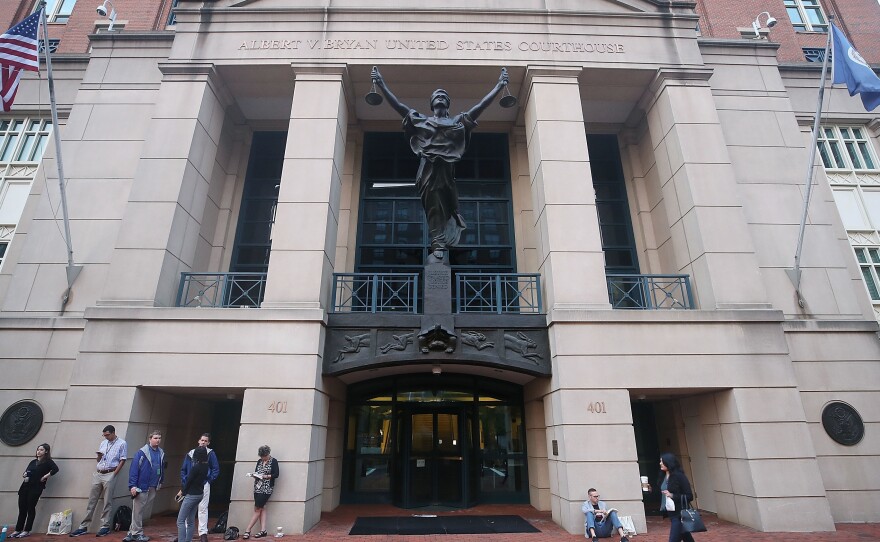Thursday is Day 3 of former Trump campaign chairman Paul Manafort's federal trial on bank and tax fraud charges in Alexandria, Va.
Prosecutors are zipping right along in their case. Assistant U.S. Attorney Uzo Asonye told the court Wednesday the government expects to close its case by the end of next week.
That was good news to Judge T.S. Ellis III, who has frequently cajoled both sides to keep things moving. Ellis wrapped up Day 2 by saying he's "hoping we can finish this case much sooner than anyone expected."
To that end, the government plowed through eight witnesses on Wednesday, including a political consultant, representatives of two luxury menswear boutiques, home contractors, a real estate agent and a comptroller of a local Mercedes-Benz dealership. All of the vendors said Manafort paid them by international wire transfer, mostly from accounts in Cyprus.
Here's a quick look at what to expect in the day ahead, and a few moments of levity from the day that was:
Plans for Day 3
It's likely to be another day heavy on documents and details. Prosecutors say they will call to the stand two more people Manafort bought goods or services from. After that, they say they'll move on to the people who handled Manafort's bookkeeping and tax preparation.
Government attorneys have meticulously traced purchases Manafort made for luxury clothing, home repairs, automobiles and other items to bank accounts he held in Cyprus and St. Vincent and the Grenadines.
They also have moved to head off the main argument of the defense's opening statement: that Manafort's troubles are the fault of Rick Gates, who they say betrayed Manafort's trust, embezzled his money and agreed to cooperate with prosecutors when he couldn't get away with it anymore.
Gates pleaded guilty in February. He was expected to testify against Manafort, although Asonye said Wednesday Gates may or may not ultimately take the stand. Prosecutors are continually reevaluating the case, he said.
On Wednesday, jurors heard from witnesses that Manafort was immersed in the details of purchases and signed off on them personally. All but one witness had never dealt with Gates at all.
The tailors of Manafort
Wednesday was a legal red carpet moment of sorts for representatives of two menswear boutiques.
The first to testify was Maximillian Katzman, who took the stand in a tailored blue suit, a striped tie and a pocket square. Katzman, 29, was the manager of his father's boutique, Alan Couture.
Katzman described Manafort, who paid the firm nearly $1 million over a five-year period for suits and other items, as a Top 5 client. He said he was the firm's only customer to pay by international wire transfer.
Judge Ellis asked whether all of the company's clients are important. Katzman paused, then replied with a grin: "I don't want to answer that," drawing a burst of laughter from the courtroom.
The other well-dressed individual was Ronald Wall, who is the chief financial officer for the menswear retailer House of Bijan. He testified that Manafort spent more than $330,000 there over a three-year period, all of it paid for by international wire transfers from foreign bank accounts.
The judge will be heard
As expected, Judge Ellis has made his voice heard during the trial. The 78-year-old, who was appointed to the bench by President Ronald Reagan, has frequently interjected himself into questioning of witnesses, aiming to correct what he views as an improperly framed question.
He instructed attorneys on Wednesday not to use the term "oligarch" to refer to the rich, politically connected businessmen who paid for Manafort's work in Ukraine. Ellis said it's frequently understood as a pejorative term and could bias jurors (who weren't present for his instructions).
"We're not going to have the case tried where [Manafort] is associated with despicable people so he is despicable," Ellis said. "That's not the American way."
Despite pressing both sides to keep the case chugging along, Ellis has wandered down the occasional tangent on his own, with self-deprecating asides (his hearing isn't what it used to be) or anecdotes about, say, his wife (who does have an email account and multiple computers).
Copyright 2018 NPR. To see more, visit http://www.npr.org/.






